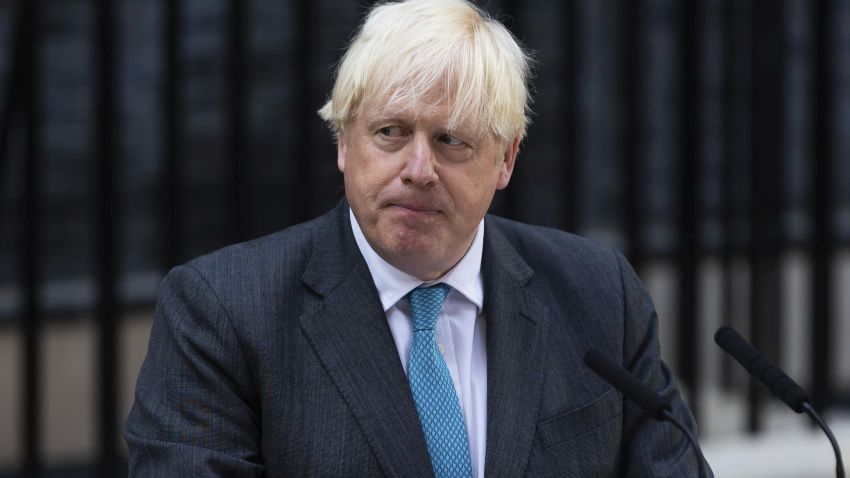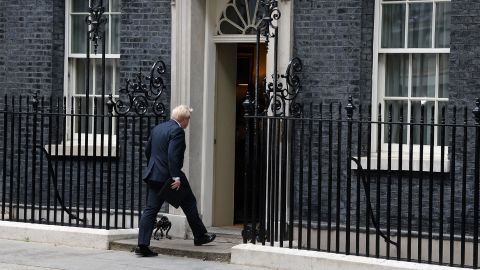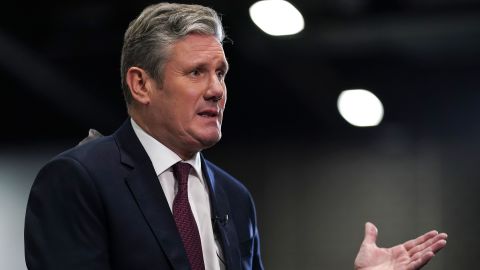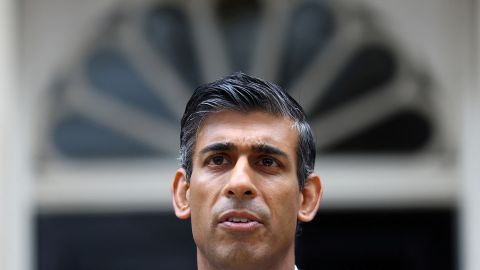
Analysis: Britain weathered political turmoil in 2022. But Brexit remains the elephant in the room

– Source: CNN ” data-uri=”archive.cms.cnn.com/_components/video-resource/instances/h_73b4f967239baea5d5931ebf75c79697-h_d2bc1b28bc9e0a69c10c06a2e83947d8@published” data-video-id=”world/2022/10/24/brexit-politics-timeline-anna-stewart-pkg-ovn-intl-contd-ldn-vpx.cnn” data-vr-video=””>


Timeline: UK set for third PM in three months. See how they got here
02:05 – Source: CNN
London CNN —
The past year has been one of the most tumultuous in modern British politics. The country has gone through three prime ministers, mourned the death of its longest-serving monarch, and is currently in the midst of a cost-of-living crisis that threatens to engulf the Conservative-voting middle classes.
The Prime Minister who seized the tiller, Rishi Sunak, spent the first weeks of his premiership trying to steady a rocky ship. His most recent predecessor, Liz Truss, had precipitated an almost unprecedented financial crisis with a reckless budget and was forced to resign after just six weeks; the previous occupant of 10 Downing Street, Boris Johnson, spent the final months of his premiership tarnishing the institution as he battled a series of damaging scandals.
Sunak’s pitch has been one of calm governance and sound economic policy that he hopes will narrow the huge polling gap between his Conservatives and the opposition Labour Party before the next general election, which must be held no later than January 2025.
But for all the carnage of 2022, one of the most consequential aspects of Britain’s new political reality has been barely discussed.

Brexit-in-full began on 1 January 2021, when the UK made the transition from a nation that was essentially a member of the EU in all but name, to a separate entity bound to the bloc by a thin trade deal.
The consequences of that hard split have already hit the British economy.
“The reality is that we increased supply-side barriers for British businesses looking to operate in the European market. So, for those businesses continuing to trade with the EU, those costs have increased, while some smaller businesses have just stopped working with the EU at all because it’s too complicated and expensive,” says Sam Lowe, a partner at Flint Global consulting agency.
The Office for Budget Responsibility confirmed earlier this year that both exports to and imports from the EU of goods and services have fallen since the full implementation of the Brexit deal, formally known as the Trade and Cooperation Agreement (TCA). The OBR concluded “there is little in the data” since the Brexit deal was implemented to suggest that the assumption of a 15% reduction in trade was misplaced.
However abstract this might sound, the real-life impact has been vegetables left to rot and fish thrown back into the sea as British exporters miss the narrow windows to get their goods into the EU. From an import perspective, Brexit has made certain foods more expensive, exacerbating the cost-of-living crisis.
Brexit’s consequences are not just economic. The UK and EU are still butting heads over the Northern Ireland Protocol – a central component of the Brexit deal agreed in 2019.
For various reasons, the UK has not fully implemented the protocol, which has led to a breakdown in the Unionist and Republican power-sharing agreement, leaving Northern Ireland without a functioning devolved government since February. Given Northern Ireland’s recent history, these tensions leave the principality in a precarious and potentially dangerous situation.

Under normal circumstances, government and opposition would be rushing to fix something causing such economic and social damage. However, six years since Brits voted to leave the EU, Brexit remains still anything but normal.
“Both main parties still feel it suits them to not talk about Brexit in any real detail. The Conservative Party doesn’t see any benefit from getting into debates that highlight what isn’t working in a deal they negotiated and voted for,” says Raoul Ruparel, a former special adviser to the British government and leading expert on Brexit.
“As for Labour, they probably cannot win a general election if people think they secretly want to rejoin the EU. Any policy that looks soft on Brexit will leave them open to attacks,” he adds.
Labour leader Keir Starmer has put forward a five-point plan to make Brexit work. However, the plan makes perfectly clear that Labour has no intention to re-join the EU nor any of its satellite institutions.
While this upsets many Labour members, accusations of Europhilia and secret plots to reverse Brexit could wreck all the work Starmer has done to bring the party closer to power than at any point in the recent past. A key aspect of Johnson’s 2019 landslide victory was Brexit-supporting traditionally Labour voters backing the Conservatives in former Labour heartlands. Starmer, bluntly, needs those votes to win.

This is the predicament facing the leading lights of British politics as they prepare for the next election. Aspects of Brexit could be improved, compromises are there to be reached with Brussels. But no one wants to light the fuse on the most explosive political issue in recent memory for fear it blows up in their face.
The consequence of such inaction is, critics say, a country without a long-term sense of direction or purpose.
“We are still lacking a strategy of where we want to go post-Brexit as a country,” says Ruparel.
“Where do we see growth coming from? Will we remain closely tied to European markets or make a deliberate pivot to the wider world? What are our advantages? We can’t compete with the US and China on large-scale manufacturing, so do we position ourselves as a center for high-end research and innovation? This all feels undecided right now.”
Even if Britain’s political class has a sudden change of heart, some experts suspect that we are beyond the point that anything significant can be done to mitigate the long-term impact of Brexit.
“It’s the UK that’s dragged its feet on implementing the full Brexit deal because we know that the logistical difficulties caused by the new paperwork and checks make life harder for British consumers and businesses,” says Vicky Pryce, former joint head of the UK’s Government Economic Service.
“That suits the EU well because it means it can complain about the UK not doing its bit while also revealing exactly where the power lies in any future negotiation. This is simply hurting the UK more than the EU,” she adds.
What exactly those negotiations could be about is also unclear.

“There’s remarkably little scope in the UK-EU trade deal for alterations,” says Anand Menon, director of the UK in a Changing Europe think tank. “They’d have to agree new deals in specific areas, which means more talks and compromise with Brussels. Which no UK politician will touch with a barge pole.”
One of the central claims that Brexit supporters made ahead of the vote in 2016 was that an independent UK would strike new trade deals and, free of EU rules and regulations, could make its economy more global and competitive.
The UK has signed new trade deals, most notably with Australia. But even the government’s own assessments predict it will have a negligible impact on GDP.
Truss tried to make supply-side reforms through lower taxes for businesses. Sunak is trying to do so by scrapping regulations on banks and the UK’s services sector. Johnson’s big plan was to make huge investments in the regions of the UK that have been left behind, creating new economic activity.

The problem, as Lowe points out, with reforming your way to competitiveness, is that “every other country is trying to do exactly the same thing.”
Contrary to Boris Johnson’s 2019 election promise to “Get Brexit Done,” the UK’s departure from the EU continues to play a significant role in the politics of the country.
It might not have played a starring role in the political drama of this year, but it’s always there, an unresolved subplot rumbling away in the background.
Brexit is a slow-burn issue, and it is unlikely that the UK will fall off a cliff overnight because of its effects. But the downsides of Brexit are impacting more people with greater regularity as time goes on.
The question Sunak and Starmer must ask themselves is whether ignoring Brexit and its consequences until after the next election is worth the risk. Because there is a chance that in the two years between now and an election, things suddenly get a lot worse.
And if that happens, the public could be left wondering what the country’s top politicians were doing sticking their heads in the sand on arguably the most important issue facing their country today.
Source: https://www.cnn.com/2022/12/27/europe/brexit-2023-intl-analysis-cmd-gbr/index.html


















